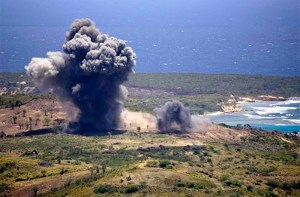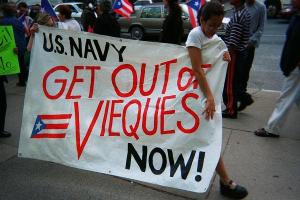
April 17, 2008. An unexploded ordinance is blown up during “cleanup” at the former Vieques Naval Training Range, on Vieques island, Puerto Rico. (AP Photo/Brennan Linsley, File)
During President Obama’s presidential campaign in 2008, he wrote a letter to the then-Governor of Puerto Rico Anibal Acevedo Vilá, promising to use his resources to clean up the environment of Vieques and to monitor the health of Viequenses affected by the military’s activities on the island (Colón-Ramos: 2015). After approximately 60 years of target practice, live-fire training, and weapons testing, the United States Navy stopped bombing Vieques on May 1, 2003. Vieques suffers from extensive ecological damage and health problems as a result of weapons testing, and the Navy is taking minimal responsibility. The cleanup process is moving slowly while the health of Viequenses continues to deteriorate. Since taking office, the Obama administration has not addressed a single issue concerning the island and its residents.
In September 2013, the National Lawyers Guild filed a petition with the Inter-American Commission of Human Rights accusing the United States Government of human rights violations of the island of Vieques. Ten Viequenses who have been diagnosed or have relatives who have been diagnosed with cancer filed the petition against the Navy and the Defense Department. Their demands are for the U.S. Government to address existing ecological damages and to improve health care facilities and transportation on the island (Kim: 2013). Currently, there are no chemotherapy facilities on the island, forcing cancer patients to take ferries and planes to treatment centers on mainland Puerto Rico or in the United States (Aljazeera 2013).

July, 2000. Rally in Hartford, CT, to end the Navy’s bombing of Vieques.
The United States Department of Veterans Affairs has recognized certain diseases to be associated with exposure to Agent Orange and other defoliants –chemicals that were introduced to Vieques over decades of weapons testing. Veterans who were exposed to Agent Orange have developed respiratory cancers, prostate cancer, Parkinson’s disease, type II diabetes, heart disease, chronic b-cell leukemia, chloracne, lymphoma, and more (U.S. Dept. of Veteran Affairs: 2015). Some of these illnesses have presented themselves in the bodies of Vieques residents who have been exposed to various chemicals from the Navy’s activities. Island residents report increased rates of cancers, asthma, diabetes, heart abnormalities, hypertension, skin conditions, and birth defects (Baver: 2006). The risk of cancer in Vieques is 27% higher than on mainland Puerto Rico, and studies have shown high levels of metals in flora, fauna, and humans on the island: 34% of Vieques residents have toxic levels of mercury, 55% are contaminated with lead, and 65% are contaminated with arsenic (Gonzalez: 2013).
The National Lawyers Guild has accused the United States of violating at least several articles of the American Declaration of the Rights and Duties of Man including: Article I, the right to life, liberty, and personal security; Article VIII, the right to residence and movement; Article IX, the right to inviolability of the home; and Article XI, the right to the preservation of health and to well-being. The actions of the United States government have endangered and stolen the lives, security, homes, health, and well-being of Viequenses.
The Agency for Toxic Substances and Disease Registry (ATSDR), an agency under the jurisdiction of the United States Department of Health and Human Services, has repeatedly concluded that they could not find “credible scientific evidence” that the Navy is responsible for any environmental or health damages on Vieques (Colón-Ramos: 2015). In 2005, the ATSDR and the National Oceanic and Atmospheric Administration (NOAA) investigated the health of land crabs on Vieques: an extremely important part of the Viequenses’ diet. This report revealed concentrations of PCB, organochloride pesticides, DDT, and chlordane in the soft tissue of land crabs (NOAA: 2006). The ATSDR concluded that the concentrations of these chemicals were not at high enough concentrations to cause negative health effects. However, this report reveals the disconcerting reality that these chemicals have entered the food web of Vieques.
In 2004, Vieques was deemed a Superfund site –also known as a hazardous waste site. From the 1950’s through 2001, the western area of the island was used as munitions storage and the east was used for weapons testing (Rangel: 2007). In a 2007 report from the United States Government Accountability Office, it was determined that the eastern area of the island requires 20 cleanup sites and the Western area requires 17 cleanup sites. The tedious, bureaucratic cleanup process is estimated to exceed $235,296,000 (Rangel: 2007) and is projected to end in the year 2029, making it the most expensive and longest cleanup in military history (Stanchich: 2013).

Destroyed military hardware at the former naval training range on Vieques Island, Puerto Rico, 2008.
This past April, Dr. Daniel Colón-Ramos wrote an open letter to President Obama, requesting that the President uphold his promise that was made during his presidential campaign in 2008. Colón-Ramos criticizes the surveying techniques of the ATSDR: lacking “credible scientific evidence” to support the hypothesis that there is no link between the Navy’s activities and the toxic environment of Vieques and the health of its citizens is comparable to going to Connecticut in the middle of the summer, not finding snow, and concluding that it never snows in Connecticut. ATSDR studies are believed by the scientific community to be “inconclusive by design” (Colón-Ramos: 2015). He calls on President Obama to reflect upon the findings of ATSDR and act on his promise. Until action is taken, the people of Vieques will continue to suffer the consequences of the United States’ human rights violations.
Beginning in 1941, the U.S. government undermined Viequenses’ right to life, liberty, and personal security; their right to residence; their right to inviolability of the home; and their right to the preservation of health and to well-being. The consequences of these human rights violations are experienced in the ecology, health, and economy of Vieques. Viequenses lack the necessary political representation and economic ability to improve their situation on their own. Improvements depend on the United States’ actions and the outcome of the pending NLG lawsuit –until then, la lucha sigue (Gold: 2014).
Click here to download the full dossier.
May 4, 2013, Carlos Pérez films a “cleanup site” in a prohibited area of the US Navy bomb testing site in Vieques.
Ismael Guadalupe Ortiz’s Testimony on Vieques, Puerto Rico, read by Mario Murillo on March 10, 2007. Ismael Guadalupe Ortiz was a Viequense public high school teacher who also fought against the U.S. military presence and bombing of Vieques.
You must be logged in to post a comment.